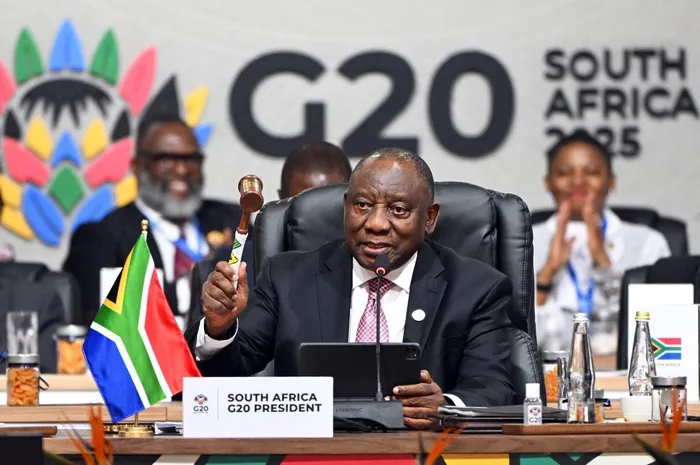G20 Summit in SA trumps detractors, puts poor countries’ issues at center of global discourse
G20

President Cyril Ramaphosa used his closing remarks on Sunday to deliver a clear message: the world’s ability to secure prosperity, stability and climate safety hinges on helping developing nations escape crushing debt, accelerating climate action, and ensuring that the global scramble for critical minerals benefits Africa.
Image: Supplied/GCIS
The G20 Leaders' Summit held for the first time on African soil in Johannesburg over the weekend has come and gone, but South Africa has successfully championed to put critical issues facing low- and middle-income countries at the center of global debate.
This is in spite of the United States boycotting the global summit and attempting to influence Heads of States not to adopt the Leaders' Declaration, which somewhat caused a minor diplomatic raw over the incoming G20 Presidency.
President Cyril Ramaphosa used his closing remarks on Sunday to deliver a clear message: the world’s ability to secure prosperity, stability and climate safety hinges on helping developing nations escape crushing debt, accelerating climate action, and ensuring that the global scramble for critical minerals benefits Africa rather than repeating past patterns of exploitation.
Ramaphosa said South Africa had used its Presidency to “place the priorities of Africa and the Global South firmly at the heart of the G20 agenda,” with debt, climate finance and critical minerals emerging as pillars of the Johannesburg consensus.
Ramaphosa warned that mounting debt burdens have become a major obstacle to achieving the Sustainable Development Goals, with many developing nations forced to divert scarce resources into interest payments instead of funding health, education or growth-enhancing infrastructure.
He warned that the growing debt burden of developing economies is now one of the chief barriers standing in the way of achieving the Sustainable Development Goals.
"The G20 has pledged to extend support to low‑ and middle‑income countries as they confront debt vulnerabilities," Ramaphosa said. "Together, we must create a virtuous cycle of reduced debt, higher public investment and more rapid and inclusive economic growth."
The statement comes as Africa faces its worst debt strain in two decades, with several countries spending more on debt servicing than social services.
According to the United Nations Conference on Trade and Development (UNCTAD), public debt in Africa reached $1.8 trillion by 2022, an increase of 183% since 2010, a rate roughly four times higher than its growth rate of GDP in dollar terms.
Africa also loses $89 billion a year to service external debt while an additional $88.6bn exits through illicit financial flows.
By placing debt at the centre of the G20 agenda, Ramaphosa signalled that the bloc must go beyond temporary relief measures, calling for scalable, systemic solutions that restore long-term fiscal sustainability.
Eric LeCompte, executive director of the religious development group Jubilee USA Network, said the statement called for improving the Common Framework, the G20 process for countries seeking debt reductions.
“The fact that the Common Framework, in five years, provided debt treatment to only four countries that requested it, is a diplomatic way of stating its limitations, since we know 26 countries have been in debt crises since at least 2018,” LeCompte said.
“The declaration seems to indicate that the G20 would like the Common Framework to become a more bankruptcy-like process or comprehensive debt restructuring process. It's unprecedented for G20 leaders to call for inclusion of borrower countries to improve international debt policies.”
Ramaphosa also said the Summit took place “as calls around the world grow louder” for dramatic progress in ending poverty, reducing inequality and combating climate change, issues that are increasingly inseparable.
Climate action was also a central feature of South Africa’s G20 Presidency, which Ramaphosa said unfolded “at a crucial moment” as extreme weather, rising temperatures and climate-driven disasters exert mounting pressure on societies worldwide, especially the poorest.
Ramaphosa highlighted South Africa’s introduction of the High-Level Voluntary Principles for Investing in Disaster Risk Reduction, urging global partners to scale up reconstruction support after climate-induced natural disasters.
“Climate‑induced natural disasters spare no country, but their toll is heaviest on those without the means to recover and rebuild,” he said. “We therefore called on G20 Leaders to urge the global community to scale up post-disaster reconstruction.”
Meanwhile, the Summit reaffirmed a commitment to increase both the quality and quantity of climate finance, particularly for nations in the Global South facing difficult transitions.
G20 members pledged to strengthen multilateral development banks, support country platforms like the Just Energy Transition Partnership (JETP), unlock private capital for green investments, and advance universal access to affordable, secure energy.
One of the most significant outcomes of the Summit was the unified endorsement of the G20 Critical Minerals Framework, which aims to ensure that the global rush for minerals used in clean energy and high-tech industries does not leave Africa behind.
For a continent that holds 30% of the world’s critical mineral reserves, Ramaphosa said the new approach signals a historic shift away from the extractive models of the past.
Italy’s Prime Minister Giorgia Meloni and Finland’s President Alexander Stubb both underscored the need for fairer, rules-based cooperation — particularly on climate, development and trade.
Meloni warned against models of globalisation that “concentrated wealth and multiplied poverty,” calling for partnerships with Africa that are “equal and generate benefits for all parties.”
Stubb stressed that the world is standing at a crossroads between “multilateralism and multipolarity,” urging nations to choose cooperation over fragmentation to tackle global crises, including climate and conflict.
BUSINESS REPORT